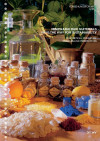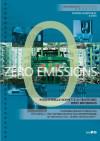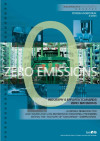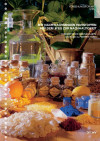Suchergebnisse
Berichte aus Energie- und Umweltforschung 5/1998 Ökologischer Vergleich von zentralen und dezentralen Abwasserreinigungsanlagen

Untersuchung von Reinigungsmethoden von belasteten Abwässern unter Anwendung von Lebenszyklusbetrachtungen
Berichte aus Energie- und Umweltforschung 1c/2001Faser- und Färbepflanzen aus ökologischem Anbau - Anbauversuche Färbepflanzen

Ertragsleistung und Farbstoffgehalt von Färber-Resede, Färberkamille und Färberknöterich auf Biobetrieben in Niederösterreich im Vergleich mit praxis- und handelsüblichen Warenpartien
Mehrsprachig
Green Biorefinery - Primary Processing and Utilization of Fibres from Green Biomass
Tests on optimisation of the essential process unit mechanical fractionation of the primary raw material "green biomass" into a liquid and a solid - fibres containing - fraction. Furthermore, lab and pilot scale tests with respect to technologies and processes for primary processing of the solid fraction (e.g. technologies for obtaining specified well defined fibre fractions, reduction of odour etc.). Finally, lab and pilot scale tests regarding manufacturing of prototype fibre products (fibreboards and adhesives & fillers for the construction sector) based on specific well defined fibre fractions from green biomass as primary raw material.
Renewable Raw Materials Pave The Way For Sustainability

Theoretical principles, chances & perspectives
Forschungsforum
3/1997
Herausgeber: BMVIT
Englisch, 6 Seiten
Downloads zur Publikation
Green Biorefinery - Separation of Lactic Acid from Grass Silage Juice (Brown Juice)
Development of a technical process to separate lactic acid from Brown Juice. Lactic acid is a promising chemical commodity which may be produced from silage juice at low costs and in an environmentally friendly way for subsequent synthesis of valuable products.
Umweltfreundliche Harzimprägnierung elektrischer Maschinen mittels Stromwärme
Die Wicklungen elektrischer Maschinen und Generatoren (z. B. Wind- und Wasserkraftgeneratoren) müssen in eine Harzmatrix eingebettet werden. Dazu soll ein neues Verfahren untersucht werden, welches die Erwärmung durch Widerstandsheizung nutzt. Dieses Verfahren hat einen sehr hohen Wirkungsgrad und führt durch schnelle Harzgelierung zu sehr geringen Emissionen.
Grüne Bioraffinerie - Gewinnung von Milchsäure aus Grassilagesaft
Erforschung eines technischen Verfahrens zur Milchsäuregewinnung aus Grassilagen. Milchsäure, eine vielversprechende ökologische Basischemikalie, wird aus fermentierter Grünmasse kostengünstig gewonnen, um zu hochwertigen Produkten weiterverarbeitet werden zu können.
Berichte aus Energie- und Umweltforschung 12/1998 Herstellung von Biokunststoffen auf der Basis landwirtschaftlicher Rohstoffe

Eine sinnvolle Alternative zu Kunststoffen auf der Basis der Erdölchemie
Berichte aus Energie- und Umweltforschung 1b/2001Faser- und Färbepflanzen aus ökologischem Anbau - Anbauversuche Fasernessel

Ertragsleistung, Fasergehalt und Faserqualität von fünf Fasernesselklonen auf einem Biobetrieb in Niederösterreich
Mehrsprachig
Chemical modification of wood particles for high value wood plastic composites
Based on promising preliminary work feasibility and recycling strategy of the modifying process shall be evaluated economically and ecologically.
Berichte aus Energie- und Umweltforschung 14/2003 Kreislaufwirtschaft mit Produkten aus nachwachsenden Rohstoffen - Voraussetzungen und Strategien

Ziel dieser Untersuchung ist es, Problemfelder der Kreislaufschließung von Produkten aus nachwachsenden Rohstoffen zu identifizieren und Handlungsoptionen aufzuzeigen.
Industrielle Schritte In Richtung Zero Emissions

Österreichische Forschung für abfall- und emissionsarme Industrieprozesse im Rahmen von "Fabrik der Zukunft"
Forschungsforum
3/2004
Herausgeber: BMVIT
Deutsch, 6 Seiten
Downloads zur Publikation
Industry´s Efforts Towards Zero Emissions

Austrian Research for Low-Waste and Low-Emissions in Industrial Processes within the "Factory of Tomorrow" Subprogram
Forschungsforum
3/2004
Herausgeber: BMVIT
Englisch, 6 Seiten
Downloads zur Publikation
Berichte aus Energie- und Umweltforschung 22/2002 Österreichisches Energieforschungs und -technologiekonzept

Ein Orientierungsrahmen für die energiebezogene Forschung und Technologie in Österreich
ZERMEG II - Zero emission retrofitting method for existing galvanising plants
ZERMEG II ist das Nachfolgeprojekt von ZERMEG, das im Rahmen der ersten Ausschreibung der Fabrik der Zukunft beauftragt wurde. In dem Projekt wurde eine Methodik entwickelt, mit der bestehende Galvanikanlagen so betrieben, umgebaut und erweitert werden können, dass sie sich unter möglichst weitgehender Reduktion des Wasser- und Chemikalieneinsatzes betreiben lassen.
ZERMEG II - Zero emission retrofitting method for existing galvanising plants
ZERMEG II is the follow up project of ZERMEG, which was commissioned after the first call of the Austrian Factory of the Future program in 2001. The project developed a method to revamp existing galvanising plants in order to operate them with a maximum reduction of the use of chemicals and maximum recycling.
Mit Nachwachsenden Rohstoffen Auf Dem Weg Zur Nachhaltigkeit

Theoretische Grundlagen, Chancen & Perspektiven
Forschungsforum
3/1997
Herausgeber: BMVIT
Deutsch, 6 Seiten
Downloads zur Publikation
Entwicklung einer kontinuierlichen Wasserstoff-Carbon Nanotubes Demo-Produktionsanlage
Mit der Entwicklung einer kontinuierlichen Wasserstoff-Kohlenstoffnanofasern Produktionsanlage werden wirtschaftlich Kohlenstoff-Nanofasern produziert und gleichzeitig Zugang zu umweltschonend produziertem Wasserstoff geschaffen.
Berichte aus Energie- und Umweltforschung 2/2001Produktion von farbstoffliefernden Pflanzen in Österreich und ihre Nutzung in der Textilindustrie

Verknüpfung des landwirtschaftlichen Angebotes an Rohstoffen mit den Erfordernissen der verarbeitenden Gewerbe- und Industriebetriebe
Mehrsprachig
Solar thermal cooling system consisting of a parabolic trough collector field and a steam jet ejector chiller
A solar thermal cooling system consisting of a parabolic trough collector field and a steam jet ejector chiller has been developed. The necessary components were built and tested and finally put together to get an operating pilot plant at the test facility.
